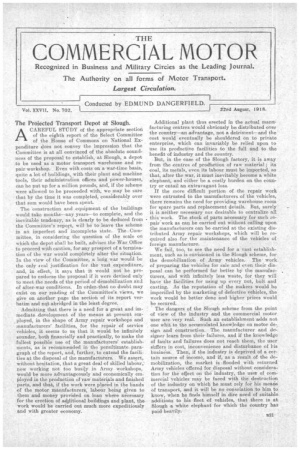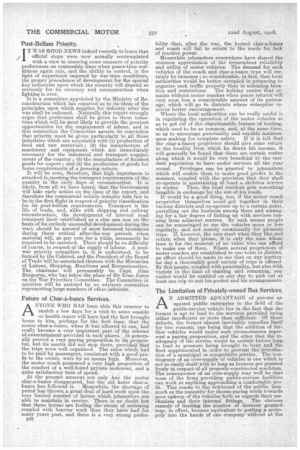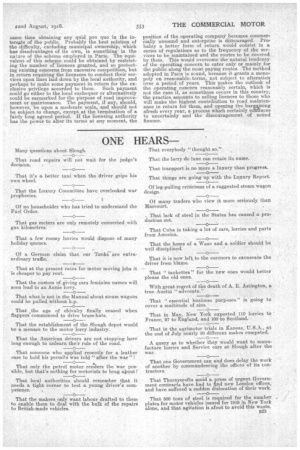The Projected Transport Depot at Slough.
Page 1

Page 2

Page 3

If you've noticed an error in this article please click here to report it so we can fix it.
ACAREFUL STUDY of the appropriate section of the eighth report of the Select Committee of the House of Commons on National Expenditure does not convey the impression that the Committee is at all convinced of the absolute soundness of the proposal to establish, at Slough, a depot to be used as a motor transport warehouse and repair workshop. Even with costs on a war-time basis, quite a lot of buildings, with their plant and machine tools, their adnainistralion offices and power-houses, can be put up for a million pounds, and, if the scheme were allowed to be proceeded with, we may be sure that by the time it was completed, considerably over that sum would have been spent.
The 'construction and equipment of the buildings would take months—nay years—to complete, and the inevitable tendency, as is clearly to be deduced from the Committee's report, will be to leave the scheme in an imperfect and incomplete state. The Coinmittee, in considering the question of the scale on which the depot shall be built, advises the War Office to proceed with caution, for any prospect of a termination of the war would completely alter the situktion. In the view of the Committee, .a, long war would be the only 4eal justification for the vast expenditure, and, in effect, it says that it would not be prepared to endorse the proposal if it were devised only to meet the needs of the period of demobilization and of after-war conditions. In order,that no doubt may exist on our reading of the Committee's views, we give on another page the section of its report verbatim aod nqt abridged in the least degree.
Admitting that there is a need for a great and immediate development of the means at present em, ployed, in the shape of Army repair workshops and manufacturers' facilities, for the repair of service vehicles, it seems to us that it would be infinitely sounder, both financially and practically, to make the • fullest possible use of the manufacturers' establishments, as is recommended in the penultimate , paragraph of the report, and, further, to extend the facilities at the disposal of the manufacturers. We assert, without hesitation, that a great deal of skilled labour; now working not too busil,y. in Army workshops, would be more advantageously and econoMically employed in the production of raw materials and finished parts, and that, if the work were placed in the hands of the motor manufacturers, labour being given to -them and money provided on loan where necessary for the erection of additional buildings and plant, the work would be carried out much more expeditiously and with greater economy. Additional plant thus erected in the actual manufacturing centres would obviously be distributed over the country—an advantage, not a detriment—and the cost would eventually be shouldered on to private enterprise, which can invariably be relied upon to use its productive facilities to the full and to the benefit of industry and the country.
But, in the case of the Slough factory, it is away from the centres of proaction of raw material ; its coal, its metals, even its labour must be imported, so that, after the war, it must inevitably become a white elephant, and either be a costly burden on the country or entail an extravagant loss.
If the more difficult portion of the repair work were entrusted to the manufacturers of the vehicles, there remains the need for providing warehouse room for spare parts and replacement details. But, surely it is neither necessary nor desirable to centralize all this work. The stock of parts necessary for such repair work as can be carried out without calling upon• the manufacturers can be carried at the existing distributed Army repair workshops, which will be required also for , the maintenance of the vehicles of foreign manufacture.
We fail, too, to see the need for a vast establishment, such as is envisioned in the Slough scheme, forthe demobilization of Army vehicles. The work of preparing the vehicles for sale and even their disposal can be performed far better by the manufac turers, and with infinitely less waste, for they willhave the facilities for using up every nut; bolt and casting. As the reputation of the makers would be imperilled by the marketing of defective vehicles, the work would be better done and higher prices would be secured. .
The dangers of the Slough scheme from the point of view of the industry and the commercial motor user are very real. Such an establishment adds not one whit to the accumulated knowledge on motor design and construction. -Tho manufacturer and designer learn from their failures, and if the knowledge of faults and failures does not reach them, the user suffers in cost, inconvenience and disturbance of his business. Then, if the industry is deprived of a certain source of income, and if, as a result .of the demobilization, the market is flooded with returned Army vehicles offered for disposal withoutconsideration for the effect on the industry, the user of corninercial vehicles may be faced with the cleatruction of the industry on which he must rely for his means of transport, and it will be no consolation to him to know, when he finds himself in dire need of suitable additions to his fleet of vehicles, that there is at Slough a daite elephant for which the country has paid heavily:
Post-Bellum Priority.
T WAS GOOD NEWS indeed recently to learn that
/ official steps were now actually contemplated with a view to ensuring some measure of priority preferences on reasonable lines when peace-time conditions again rule, and the ability to control, in the light of experience imposed by war-time conditions, the proper precedence of development for the special key industries upon which the country will depend so seriously for its recovery and reconstruction when i fighting s over.
It is a committee appointed by the Ministry of Reconstruction which has reported as to its ideas of the principles upon which supplies for industry after the war shall be rationed. Naturally this report strongly urges that preference shall be given to those industries which will be most likely to provide the greatest opportunities for the employment of labour, and in this connection the Committee asserts its conviction that priority must be given .particularly to all those industries which are associated with (1) production of food and raw materials; (2) the manufacture of machinery and equipment which are immediately necessary for the industrial and transport requirements of the country ; (3) the mamifacture of finished goods for export; and (4) the production of goods for home requirements of a, pressing nature.
It will be seen, therefore, that high importance is attached tojneeting the transport requirements of the country in the early days of reconstruction. It is likely, from all we have heard, that the Government will take early action on the lines of the report, and therefore the commercial vehicle industry bids fair to be in the first flight in respect of priority classification for its poet-belIum requirements. Transport is the life of trade, and, alike with shipping and railway reconstruction, the .development of internal road transport. (now established as a sine qua. non on the basis of its entirely successful development during the war), should be assured of most favoured treatment during those critical after-the-war periods when material will, at any rate for a while, necessarily be required to be rationed. There should be no difficulty of course, in respect of the supply of labour. A postwar priority committee is, it is understood, to be formed by the Cabinet, and the President of the Board of Trade will be associated thereon with the Ministries of Labour, Shipping, Munitions and Reconstruction. The chairman will presumably be Capt. Alan Burgoyne,, who has taken the place of Sir Evan Jones on the War Priorities Committee. The Committee in question will be assisted by an advisory committee representing large numbers of other interests.
Future of Char-a-bancs Services.
ANYONE WHO HAS been able this summer to snatch a few days for a visit to some seaside or health resort will have had the fact brought home to him, perhaps for the first time, that the motor char-a-bancs, when it was allowed to run, had really become a very impOrtant part of the scheme oilentertainment provided in such places. It generaally proved a very paying proposition to its proprietor, but its merits did not stop there, provided that the trips were well organized. The rates which had to be paid by passengers, consistent with a good profit to the owner, were by no means high. Moreover, the motor coach possessed a very high proportion of the comfort of a well-found private motorcar, and a quite satisfactory turn, of speed.
At the present moment not only has the motor char-a-banes disappeared, but the old horse ehar-abasics has followed_ it. Meanwhile, the shortage of petrol has thrown a great deal of hard :work upon the very limited number of horses which joie/masters are able to maintain in service. There is no doubt but that these horses are feeling the strain of rationing coupled with heavier work than they have had for many years past, and there is a very strong proba
bility that, after the war, the horsed char-a-bancs and coach will fail to return-to the roads for lack of tractive power. Meanwhile jobmasters everywhere have shared the common appreciation of the tremendous reliabilitr. and utility, of motor vehicles. The demand for such vehicles of the coach and char-a-bancs type will certainly be immense ; so considerable, in fact, that local authorities would be better occupied in preparing to organize such traffic properly than in scheming taxation and restrictions. The holiday centre that remains without motor coaches when peace returns will very soon lose a considerable amount of its patronage, which will go to districts where enterprise receives better encouragement.
Where the local authorities can be really useful is in regulating the operation of the motor vehicles so as to get rid of the objectionable feature of touting, which used to be so common, and, at the same time, so as to encourage punctuality and capable maintenance making for complete safety. If it is felt that the char.a-bancs proprietor should give some return to the locality from which he draws hi i income, it will generally be found that there are certain routes along which it would be very beneficial to the resident population to have motor services all the year
round. Privileges can be granted to jobinasters which will enable them to make good profits in the summer, coupled with the provision that they shall co-operate in maintaining at least a skeleton service in winter. Thus, the local resident guts something tangible in exchange for the use of his roads.
It would be a good thing, too, if the motor coach proprietor themselves 'could get together in their various districts and co-operate up to a certain point, parcelling out the business among them and arranging for a fair degree of linking up with services run. ning from adjacent centres. By such means people can be encouraged to use the vehicles more or less regularly, and not merely occasionally for pleasure trips. If, however, the cars start when they like and return when they please, it is only the man whose time is for the moment. of no value' who can afford to make use of them. Where several proprietors of motor coaches are established in one town or district, an effort should be made to see that on any particular day a thoroughly good variety of trips is offered. By this means, coupled with punctuality, but also with variety in the time of starting and returning, any visitor would be enabled on any day to pick out at least one trip to suit his pocket and his arrangements.
The Limitation of Privately-owned Bus Services.
AN ADMITTED ADVANTAGE of private as against public enterprise in the field of the public-service vehicle lies in. the fact that the former is apt to lead to the services provided being either insufficient or more than sufficient. Of these defects, the former almost inevitably remedies itself for two reasons, one being that the addition of further vehicles would under such circumstances represent a paying proposition, and the other that the inadequacy of the service would be certain before long to lead to pressure being brought to bear and the fleet supplemented in order to prevent the_ introduction of a municipal or competitive service. The 'eontingency of an over-supply of vehicles is one which is not so easily dealt with so long as licences are granted freely in respect of all properly-constructed machines. The consequence of an over-supply may well be -that none of the firms providing public-service facilities can work at anything approaching a comfortable profit. This reacts to the detriment of the public, inasmuch as the necessity for cheese-paring tends towards poor upkeep of the vehicles both as regards their mechanism and their internal fittings. The obvious remedy of limiting the number of licences granted may, in effect, become equivalent to putting a monopoly into the hands of one company without at the
same time obtaining any quid pro quo in the intereats of the public. Probably the best solution of the difficulty, excluding municipal ownership, which has disadvantages of its own, is something in the nature of the scheme employed in Paris. The equivalent of this scheme could be obtained by restricting the number of licences granted, and so protecting existing concerns from excessive competition, but in return requiring the licensees to conduct their services upon lines laid down by the local authority, and perhaps to make some payment in return for the exclusive privilege accorded to them. Such payment could go either to the local exchequer or alternatively could be earmarked for the Purpose of road improvement or maintenance. The payment, if any, should, however, be upon a moderate scale, and should not be subject to change, except at the termination of a fairly long agreed period. If the licensing authority has the power to alter its terms at any moment, the position of the operating company becomes commercially unsound and enterprise is discouraged. Probably a better form of return would consist in a series of regulations as to the frequency of the services to be maintained and the routes to be covered by them. This would overcome the natural tendency of the operating concern to cater only or mainly for the public along the most paying routes. The method adopted in Paris is sound, because it grants a monopoly on reasonable, terms, not subject to alteration over a period of years. This makes the outlook of the operating concern reasonably certain, which is not the case if, as sometimes occurs in this country, the practice amounts to selling licences to those who will make the highest contribution to road maintenance in return for them, and opening the bar ..ning afresh every year, a process which certainly ea': uces to uncertainty and the discouragement of sound finance.






















